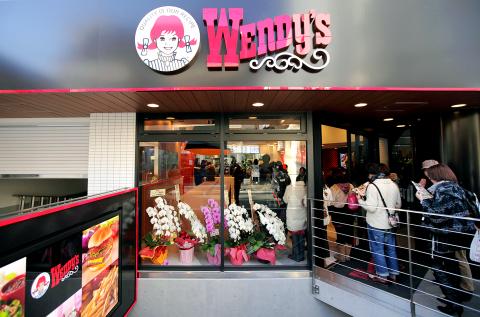Wendy’s Co, the third-biggest US fast-food chain, added goose-liver pate and truffles to burgers as it invests as much as US$200 million on a return to Japan two years after leaving the country.
The Japan Premium sandwich sells for ¥1,280 (US$16) at Wendy’s in Tokyo’s Omotesando luxury shopping area, the first of a targeted 100 shops. “We think the fast-food market here is ready for something different,” Ernest Higa, chief executive officer of Wendy’s Japan LLC, said in an interview at the restaurant’s opening on Tuesday.
Wendy’s is re-entering Japan under a plan to expand outside the US, where it got 92 percent of revenue last year, after posting losses in six of the past eight quarters. The Dublin, Ohio-based chain is focusing on the world’s second-biggest fast-food market first as it looks for operating partners in China and Brazil.

Photo: Bloomberg
“Japan is the most important of the three to me, because we are actually selling burgers here today,” Darrell van Ligten, international division president, said in an interview in Omotesando.
The company expects to eventually expand to about 700 restaurants in Japan, compared with about 3,300 for McDonald’s Corp’s local unit, the nation’s biggest fast-food burger chain.
Wendy’s ended a 30-year run in Japan in 2009 after its partner Zensho Holdings Co declined to renew the agreement, saying it would focus on building its main Sukiya chain of beef-bowl restaurants.
“Our partner had a pretty significant business which was their primary focus,” van Ligten said. “Given the size of the different businesses, Wendy’s wasn’t as much of a focus area as we would have liked it to be.”
In coming back to Japan, the burger chain is counting on its premium menu to lure customers in a “very, very competitive” environment, Higa said.
Wendy’s menu pits it against Japanese rivals, including Mos Food Services Inc’s Mos Burger in terms of taste and Lotteria Co, which has a ¥1,800 Matsuzaka beef burger, for premium items.
However, Japan’s outlook for slow economic growth adds to the pressure on Wendy’s to find a new niche in the industry.
The Bank of Japan last week said the economy’s rebound from the March 11 earthquake has come to a pause, lowering its evaluation for a second straight month because of the local currency’s strength and a cooler global expansion.
McDonald’s Holdings Co Japan forecasts sales of ¥304.5 billion this year, a third straight annual decline and 25 percent less than 2008 revenue.
“With the economic situation, you need to bring something that is unique and exciting,” Higa said.
The “new fashion” of high-end fast food will give the chain what it needs to thrive, he said.

CAUTIOUS RECOVERY: While the manufacturing sector returned to growth amid the US-China trade truce, firms remain wary as uncertainty clouds the outlook, the CIER said The local manufacturing sector returned to expansion last month, as the official purchasing managers’ index (PMI) rose 2.1 points to 51.0, driven by a temporary easing in US-China trade tensions, the Chung-Hua Institution for Economic Research (CIER, 中華經濟研究院) said yesterday. The PMI gauges the health of the manufacturing industry, with readings above 50 indicating expansion and those below 50 signaling contraction. “Firms are not as pessimistic as they were in April, but they remain far from optimistic,” CIER president Lien Hsien-ming (連賢明) said at a news conference. The full impact of US tariff decisions is unlikely to become clear until later this month

Popular vape brands such as Geek Bar might get more expensive in the US — if you can find them at all. Shipments of vapes from China to the US ground to a near halt last month from a year ago, official data showed, hit by US President Donald Trump’s tariffs and a crackdown on unauthorized e-cigarettes in the world’s biggest market for smoking alternatives. That includes Geek Bar, a brand of flavored vapes that is not authorized to sell in the US, but which had been widely available due to porous import controls. One retailer, who asked not to be named, because

CHIP DUTIES: TSMC said it voiced its concerns to Washington about tariffs, telling the US commerce department that it wants ‘fair treatment’ to protect its competitiveness Taiwan Semiconductor Manufacturing Co (TSMC, 台積電) yesterday reiterated robust business prospects for this year as strong artificial intelligence (AI) chip demand from Nvidia Corp and other customers would absorb the impacts of US tariffs. “The impact of tariffs would be indirect, as the custom tax is the importers’ responsibility, not the exporters,” TSMC chairman and chief executive officer C.C. Wei (魏哲家) said at the chipmaker’s annual shareholders’ meeting in Hsinchu City. TSMC’s business could be affected if people become reluctant to buy electronics due to inflated prices, Wei said. In addition, the chipmaker has voiced its concern to the US Department of Commerce

STILL LOADED: Last year’s richest person, Quanta Computer Inc chairman Barry Lam, dropped to second place despite an 8 percent increase in his wealth to US$12.6 billion Staff writer, with CNA Daniel Tsai (蔡明忠) and Richard Tsai (蔡明興), the brothers who run Fubon Group (富邦集團), topped the Forbes list of Taiwan’s 50 richest people this year, released on Wednesday in New York. The magazine said that a stronger New Taiwan dollar pushed the combined wealth of Taiwan’s 50 richest people up 13 percent, from US$174 billion to US$197 billion, with 36 of the people on the list seeing their wealth increase. That came as Taiwan’s economy grew 4.6 percent last year, its fastest pace in three years, driven by the strong performance of the semiconductor industry, the magazine said. The Tsai